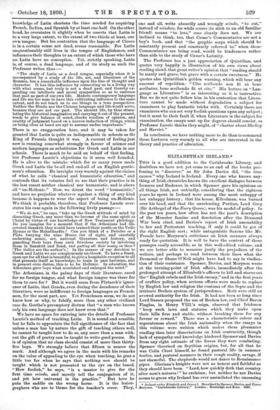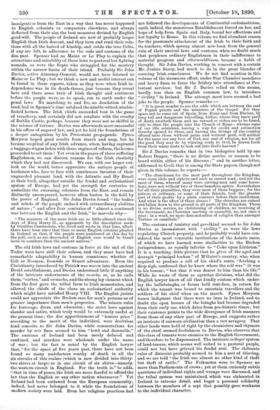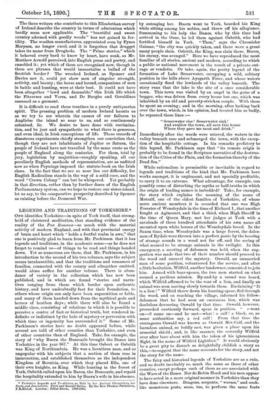ELIZABETHAN IRELAND.*
Tars is a good addition to the Carisbrooke Library, and doubtless we have not yet come to an end of the books pro- fessing to "discover," as Sir John Davies did, "the true causes" why Ireland is Ireland. Every one who knows any- thing of Irish chronicles knows the excellent dialogue between Iremens and Endoxus, in which Spenser gave his opinions on all things Irish, not unkindly, considering that the eighteen years he spent in Ireland were among the most unhappy of her unhappy history ; that his house, Kilcolman, was burned over his head, and that the unrelenting Puritan, Lord Grey (Sir Axthegal of the Faery Queen), was his model of policy. In the past ten years, how often has not the poet's description of the Munster famine and desolation after the Desmond War been cited, and Davies's report of Irish amenability to law and Protestant teaching, if only it could be got of the right English sort; while antagonistic Saxons like Mr. Froude have Moryson's criticisms on Irish manners always ready for quotation. It is well to have the context of these passages easily accessible, as in this well-edited volume, and we are better able to measure justly the prejudices of the writers, and perhaps to read between their lines what the Desmond or Shane O'Neil might have had to say in vindica- tion of their resistance. Spenser, Davies, and Moryson wrote at the turning-point of Irish affairs, immediately after the prolonged attempt of Elizabeth's officers to kill and starve out the" English rebels and the Irish enemy," and in the first years of craftier policy, when serious efforts were made to replace by English law and religion the customs of the Septa and the intricate Brehon system of jurisprudence. Both were still an avowed authority for the Irish. It had not been so long since Lord Sussex proposed the use of Brehon law, and Chief Baron Finglas, in Henry VIII.'s reign, observed that Irishmen "keep such laws and statutes which they make upon their hills firm and stable, without breaking them for any favour or reward." There was a characteristic colour and separateness about the Irish nationality when the essays in this volume were written which makes them pleasanter reading than later dissertations on Irish contrariety, though lack of sympathy and knowledge hindered Spenser and Davies from any right estimate of the forces they were combating. Spenser theorised on Scythian origins, but, for all that he was Colin Clout himself, he found pastoral life in summer booties, and pastoral manners in their rough reality, savage, if not shameful. The shepherds would not dance to Renaissance pipes. Gloriana's knights were not as honest and faithful as they should have been. "Lord, how quickly doth that country alter men's natures !" he exclaims; but neither he nor Davies seems to guess why Ireland has ever assimilated the unceasing • Ireland ender Elisabeth and James L Described by Sprmaer,Davies, and Fynee Moryson. " Cariabrooke Library." London: Rontledge and SOUS. 1880.
immigration from the East in a way that has never happened to English colonists or conquerors elsewhere, and always deflected from their aim the best measures devised by English good-will. The people of Ireland are now of probably larger English than Irish descent, and they turn and rend their rela- tions with all the hatred of kinship, and outdo the true Celts,
if any are left, in adherence to the code and customs of the dim past. Spenser had. no Maine or Le Play to explain the attractions and suitability of these laws to pastoral but fighting
nomads, as were the Septs who struggled for the mastery within the narrow limits of their island. Probably Sir John
Davies, active Attorney-General, would not have listened to Maine or Le Play ; but we think a new and useful interest can
be found in these reports, taken as they were when Irish in- dependence was in its death-throes, just because they reveal here and there some trait of Irish thought and sentiment before the people were, so to speak, run to earth under the penal laws. No marching to and fro, no desolation of the land, had in Spenser's time subdued the nimble-witted, nimble- footed kernes. The Irish chiefs succeeded best in the game of treachery, and certainly did not retaliate with the cruelty of Dublin Castle, perhaps because they were not so skilful in the science of torture. Davies was afterwards more successful in his offers of sugared law, and yet he laid the foundations of a deeper antagonism by his Protestant propaganda. Fynes Moryson hoped good results from starch and soap, but he became sceptical of any Irish advance, when, having captured a baggage-wagon laden with these engines of reform, the kernes proceeded to eat them ! Yet even in the pages of these suffering Englishmen, we can discern reasons for the Irish elasticity which they had not discovered. We can, with our larger out- look on the world, better appreciate the antique people of herdsmen who, face to face with continuous invasion of their amguarded pleasant land, with the Atlantic and Hy Brasil at their back, altogether outside the feudal and ecclesiastical system of Europe, had yet the strength for centuries to assimilate the swarming colonists from the East, and remain distinctly unconquered, however often beaten in the field by the power of England. Sir John Davies found "the bodies and minds of the people endued with extraordinary abilities
of nature ; " and after four centuries of "almost a continued war between the English and the Irish," he marvels why— "The manners of the mere Irish are so little altered since the days of King Henry II., as appeareth by the description made by Giraldus Cambrensis, who lived and wrote in that time, albeit there have been since that time so many English colonies planted in Ireland as that, if the people were numbered at this day by the poll, such as are descended of English race would be found more in numbers than the ancient natives."
The old Irish laws and customs ia force at the end of the Tudor wars have still their echoes, and they must have had
remarkable adaptability to human conscience, whether of Celt or Norman, Ironside or Stuart adventurer. Even the Christianity introduced by Patrick was woven into the ancient Druid establishment, and Davies understood little if anything of the intricate endowments of the co-arbs, or, as he calls
them, "corbes," and erenachs, and the strong lay element which from the first gave the tribal form to Irish monasteries, and allowed the chiefs of the clans an ecclesiastical authority which might have satisfied Henry VIII. The English jurists could not appreciate the Brehon care for men's persons as of greater importance than men's properties. The minute rules for fosterage, dress, and education ; the strict laws against slander and satire, which truly would be extremely useful at the present time; the due apportionment of "honour price" according to the merit of the individual, were doubtless fond conceits to Sir John Davies, while commutations for murder by eric fines seemed to him "lewd and damnable." The customs of Ireland had been sorely defaced and 'confused, and murders were wholesale under the name of war ; but the fact is noted by the English lawyer that, "for the space pf five years past, there have not been found so many malefactors worthy of death in all the six circuits of this realme (which is now divided into thirty- two shires at large) as in one circuit of six shires—namely,
the western circuit in England. For the truth is," he adds, 4‘ that in time of peace, the Irish are more fearful to offend the law than the English or any other nation whatsoever." Yet
Ireland had been outlawed from the European community; indeed, had never belonged to it while the foundations of modern society were laid. Even her religious practices had not followed the developments of Continental ecclesiasticism, until, indeed, the monstrous Establishment forced on her, and hope of help from Spain and Italy, bound her affections and her loyalty to Rome. In this volume we find abundant reason for the passionate attachment of the Irish to their faith and its teachers, which sprung almost new-born from the general ruin of their ancient laws and customs, when no doubt much that perplexes ordinary Englishmen in their indifference to material progress and otherworldliness, became a habit of thought. Sir John Davies, working in concert with a certain Mr. Justice Saxey, had much to do in the great blunder of coercing Irish consciences. We do not find mention in this volume of the strenuous effort, under Star Chamber mandates and heavy fines, to force the Irishry into attendance at Pro-
testant services ; but Sir J. Davies relied on this means, hardly less than on English common law, to introduce " civility " in Ireland. The attempt must have seemed a bad
joke to the people. Spenser remarks :—
"It is great wonder to see the odds which are between the zeal of Popish priests and the ministers of the Gospel. For they spare not to come out of Spain, from Rome and from Rheims, by long toil and dangerous travelling, hither, where they know peril of death awaiteth them and no reward or riches are to be found, only to draw the people into the Church of Rome : whenas sew of our idle ministers, having a way for credit and estimation thereby opened to them, and having the livings of the country offered unto them without pains and without peril, will neither for the same nor any love of God, nor zeal of religion, nor for all the good they may do by winning souls to God, be drawn forth from their warm nests to look out into God's harvest."
Sir J. Davies remarks that in two bishoprics held by one Robert Draper, "there is no divine service or sermon to be heard within either of his dioceses ; " and in another letter, addressed to Cecil, that is among the State papers, though not given in this volume, he reports :—
"The churchmen for the most part tluoughout the Kingdom, were mere idols and ciphers and such as cannot read ; and yet the most of them, whereof many were serving-men and some horse- boys, were not without two or three benefices apiece. N evertheless for all their pluralities, they were most of them beggars ; for the patron, or ordinary, or some of their friends, took the greater part of their profits by a plain contract before their institution. And what is the effect of these abuses ? The churches are ruined and fallen down to the ground in all parts of the Kingdom. There is no divine service, no christening of children, no receiving of the Sacrament, no Christian meeting or assembly, no, not once a year; in a word, no more demonstration of religion than amongst Tartars or cannibals."
The customs of tanistry and gavelkind seemed to Sir John Davies as inconsistent with " civility " as were the laws regulating Church property, and he probably would have con- sidered the most venerable institutions of the Asiatic races,
of which we have learned some similarities to the Brehon jurisprudence, as equally inferior to "Coke upon Littleton." It is a touching little picture that he gives of the aged and decrepit "principal brehon " of M`Guire's country, who, when required to produce a roll of his chief's rents, "fetching a deep sigh, confessed that he knew where the roll was" (it was in his bosom), "but that it was dearer to him than his life." While he wrote of them as agrarian divisions, what did the English lawyer know of all that kindly custom which under- lay the ballebetaghs, or farms held rent-free, in return for which the tenant was bound to entertain travellers and the soldiers of his chief when on the march. Fynes l!doryson waxes indignant that there were no inns in Ireland, and no doubt the open houses of the betaghs had become degraded from their early use, which dates from pre-historic times; but their existence points to the wide divergence of Irish manners from those of any other part of Europe, and suggests rather an intricate if outworn civilisation than a raw savagery. That other lands were held of right by the chroniclers and rhymers of the chief, seemed foolishness to Davies, who observes that this class of tenants were enemies to the English Government, and therefore to be dispossessed. The intricate metayer system of land-tenure, which seems well suited to a pastoral people, could not but have grieved his feudal soul. The elaborate rules of distraint probably seemed to him a sort of thieving, and we are told "the Irish use almost no other kind of theft but theft of cattle." The Folkmotes were to Spenser no more than Parliaments of crows ; yet at them curiously subtle questions of individual rights and wrongs were discussed, and the tribal system was maintained, which was elaborated in Ireland to extreme detail, and begot a personal solidarity between the members of a sept that possibly gave weakness to the individual character. The three writers who contribute to this Elizabethan survey of Ireland describe the country in terms of admiration which hardly seem now applicable. The "beautiful and sweet country adorned with goodly woods" has not gained in fer- tility. The woollen manufactures, appreciated even by Fynes Moryson, no longer excel, and it is forgotten that drugget takes its name from Drogheda. The "Prime stories," which it behoved every bard to know by heart, have sunk, as Mr. Matthew Arnold perceived, into English prose and poetry, and ennobled it; yet which of them are recognised now, though in them are phrases that would immortalise a ballad of the Scottish border ? The wrecked Ireland, as Spenser and Davies saw it, could yet show men of singular strength, activity, and beauty ; the horse and hound, companions of men in battle and hunting, were at their best. It could not have been altogether "lewd and damnable," this Irish life which the Fitzarses and Veres, and De Burghs and Geraldines assumed as a garment.
It is difficult to read these treatises in a purely antiquarian spirit. The pressing problem of modern Ireland haunts us as we try to see wherein the causes of our failures to Anglicise the island so near to us, and so continuously colonised, lie. We desire to have done with recrimina- tion, and be just and sympathetic to what there is generous, and even ideal, in Irish conceptions of life. These records of disastrous experiments chiefly strengthen our conviction that, though they are not inhabitants of Jupiter or Saturn, the people of Ireland have not travelled by the same route as the people of England along the centuries. For them, trial by jury, legislation by majorities—roughly speaking, all our peculiarly English methods of representation, are as unfitted now as when Poynings imposed the statute-book on the Irish clans. In the fact that we are so near lies our difficulty, for English Radicalism stands in the way of a solid cure, and the word "Crown Colony" can but be whispered. Yet probably in that direction, rather than by further doses of the English Parliamentary system, can we hope to restore our sister-island, let us say, to the comparative prosperity described by Spenser as existing before the Desmond War.








































 Previous page
Previous page